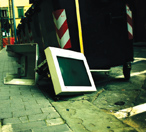 With our increasing consumption of electronic items, India’s e-waste is steadily increasing as well. E-waste consists of a range of obsolete electronic devices such as computers, monitors, phones and pagers, calculators, audio and video devices, printers, scanners, refrigerators, air conditioners, washing machines, microwave ovens and so on. All of these electronic goods contain a lot of hazardous material and they should be recycled in a controlled environment.
With our increasing consumption of electronic items, India’s e-waste is steadily increasing as well. E-waste consists of a range of obsolete electronic devices such as computers, monitors, phones and pagers, calculators, audio and video devices, printers, scanners, refrigerators, air conditioners, washing machines, microwave ovens and so on. All of these electronic goods contain a lot of hazardous material and they should be recycled in a controlled environment.
If not recycled properly, e-waste wreaks havoc on our environment, from polluting water with heavy metals like mercury and lead to releasing carcinogenic air pollutants. E-waste should never be disposed of with other household wastes and should not be given to scrap dealers or unauthorised recyclers. We keep buying and discarding these items each year without thinking of where this waste is going; directly into our environment. According to research reports, e-waste in India is growing at more than 20 per cent and is expected to cross 8,00,000 tonnes by 2012. By 2015, two billion PCs are expected to invade our homes and our mobile subscriber base is expected to be about 450 million.
Nitin Gupta, the CEO of India’s first e-waste recycling company, Attero Recycing, says, “The biggest challenges when it comes to educating people about e-waste include a lack of awareness, a large unorganised market of e-waste disposal and the psyche of making profit out of e-waste rather than disposing of it ethically. A number of companies do have an e-waste policy but most of these have different policies globally and different ones in India.” The corporate mindset is gradually changing but there is a long way to go.
All environmentally responsible companies should take back their used products for recycling. E-waste recycling channels should be used vigorously by the common man to dispose of their e-junk.
Recycling e-waste occurs through an environmentally friendly process that extracts precious metals from scrap. About 97-98 per cent of the waste is recycled, and pure metals like copper, iron and aluminium are sold back into the market. During the recycling process, data security is taken care of too.
With pan-India teams who are in touch with consumers to educate them about e-waste and provide pick-up services, Attero is working on reducing our carbon footprint. The company is capable of recycling about 36,000 tonnes of e-waste per annum, a very small percentage of the waste we actually produce! People first need to be ready to give their e-waste away. It will take time, but by creating awareness on the harm that these electronic devices cause to the environment, we can begin to recycle our electronics successfully in the future.
Log on to www.atterobay.com to learn how to recycle your e-waste.
Volume 1 Issue 7































